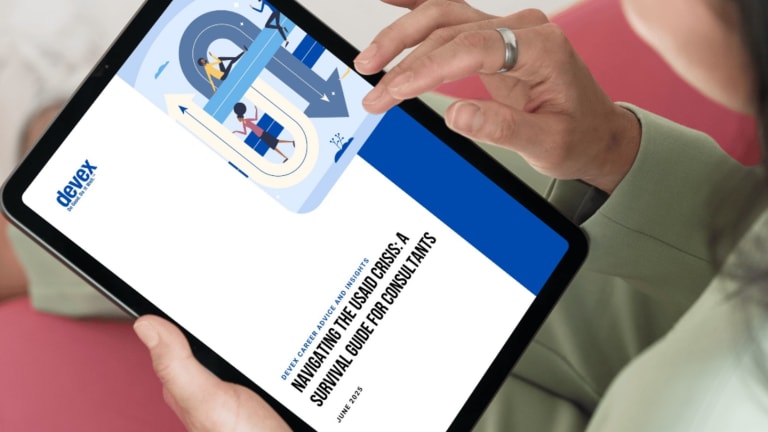
The International Fund for Agricultural Development is making adjustments to its policy on consultants as part of a continued push to enhance the organization’s efficiency and effectiveness.
Instead of hiring a majority of external consultants to carry out its projects overseas, IFAD now wants to strengthen its in-house expertise, hire more local experts, seek new skills and attitudes, and change its operational modalities.
Documents from the latest sessions of the evaluation committee suggest the Rome-based U.N. agency’s management and the Independent Office of Evaluation have agreed on the need to “expand in-house expertise on core activities, while rationalizing the use of consultants.” IFAD would thus limit the employment of external consultants to specific or non-core issues.
Fabrizio Felloni, EOI officer in charge, believes the agency is making excessive use of external human resources.
“Consultants work with IFAD five or six years. When the collaboration ends, riches of knowledge and experience risk to be wasted or at least do not remain within [the agency],” he told Devex. “[Our] opinion is that in the future IFAD should think to spend more [money] on internal expertise and maybe economize on consultants.”
Felloni however thinks expanding in-house teams would be feasible only in the agency’s core areas of activity, like micro-enterprises or microfinance.
Local vs. international consultants
In line with the review strategy on consultants, increasing the employment of local or regional experts will be priority for IFAD.
“We are expanding into many countries, setting up country offices, and we are always on the lookout for how we can collaborate more with local resources. Because, after all, they know the country far better than anyone,” IFAD human resources officer Ama Brandford-Arthur told Devex.
That doesn’t mean — she clarified — that the organization is “excluding anyone” from the process. In fact, international consultants will remain a key component for IFAD, albeit with a new focus on aiming for the “right balance” between local and international experts.
“Employment of local consultants help build local expertise … [but] international consultants allow us to bring in the experiences of other countries, make comparisons and generate a flow of knowledge from one country to another,” said Felloni.
New skills, attitudes
Apart from the focus on local hiring, IFAD will be searching for specialists in new areas of expertise as the U.N. agency moves into broader strategic areas that require different skill sets, among them a certain knowledge of business.
“We have recognized that we need to look at a new type of consultant, one that has an eye both for development [and for] the importance of business,” explained Brandford-Arthur.
These professionals should be able to deal with climate change, gender, public private partnerships, nutrition, food security, agribusiness, value chain, market access, rural finance and remittances. And on top of these skill sets, IFAD needs specific attitudes.
“There has to be a new way of working that recognizes that ultimately who we need to work with are the rural people. [Personnel must] have the attitude of helping rather than imposing,” noted the HR officer.
According to Brandford-Arthur, a good consultant must be humble, must have a collaborative approach, admitting he/she does not have all the answers, be flexible and able to change direction quickly.
“We need to look for new blood, new experiences … not working always with the same [people], but offering opportunities to the younger generations,” said Felloni.
Centralized roster
Rationalization doesn’t necessarily mean changing staffing levels, having more or less staff, but mainly improving the management of human resources, according to Brandford-Arthur.
The first challenge is to find the right consultant when needed. Until now, IFAD recruitment of external specialists has been pretty much informal. Lacking a centralized roster, managers are used to hiring from their own informal network of contacts.
“Working in HR, the main constraint has been being able to assist managers when they look for consultants … [When a manager, for example,] tells me, ‘I need a consultant who has worked in Latin America on gender and finance. Could you find one for me?’ it has been difficult for me to immediately pull up any record,” said the IFAD recruiter.
This is why the organization is now moving toward an integrated database of potential candidates and an electronic system to manage the selection.
“[What] we are trying to do is to effectively streamline the use of consultants in a way that better captures their contribution to the work of IFAD … the areas of specialization that each consultant has,” she noted.
Felloni, meanwhile, added that the recruitment process should also be more competitive, for example by looking at different options, evaluating at least two or three candidates, and involving more officers in the evaluation process.
Monitoring and evaluation
In many organizations, external consultants have been blamed for inefficiencies, and even in some cases linked to allegations of corruption, as FAO Director-General José Graziano da Silva recently admitted in an exclusive interview with Devex.
Felloni however believes consultants are not so difficult to monitor.
In his opinion, external experts must be overseen carefully as part of the strategy to develop a work program with clear deadlines and expected outcomes.
“We have [good] tools for consultants’ evaluation. The issue is to use them better [and] make the managers responsible [for that],” he said.
See more:
Read more development aid news online, and subscribe to The Development Newswire to receive top international development headlines from the world’s leading donors, news sources and opinion leaders — emailed to you FREE every business day.








